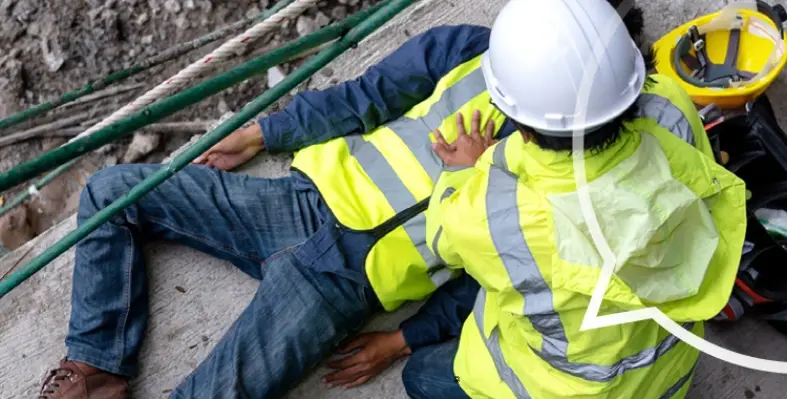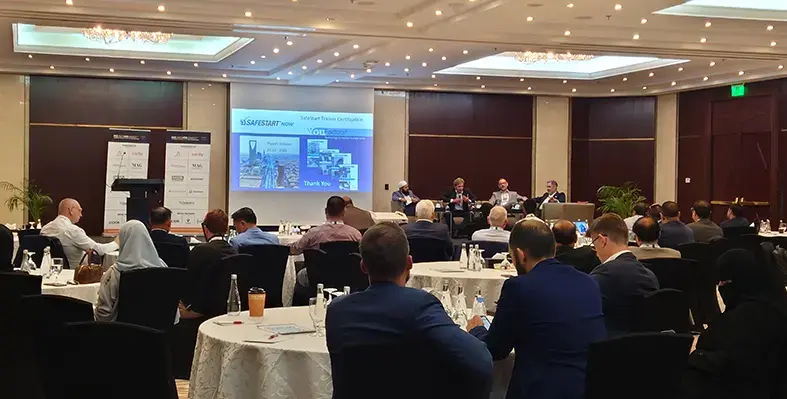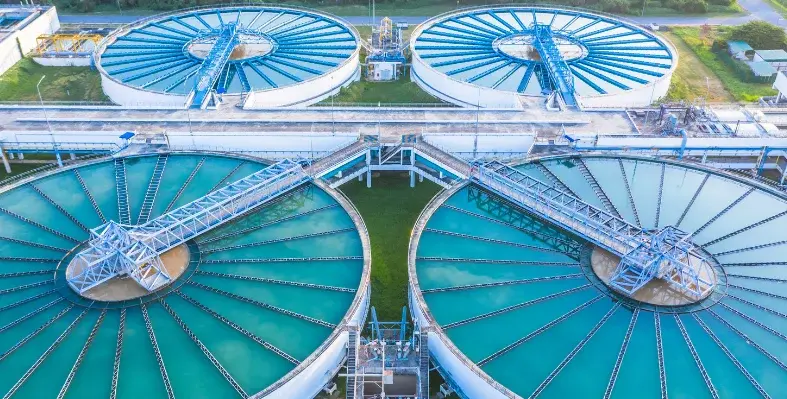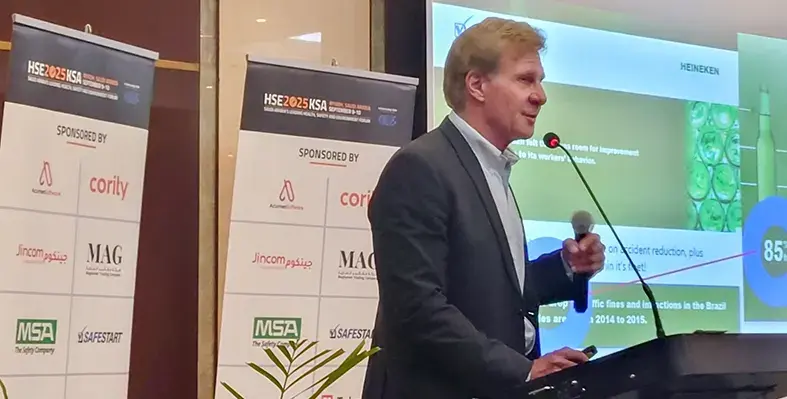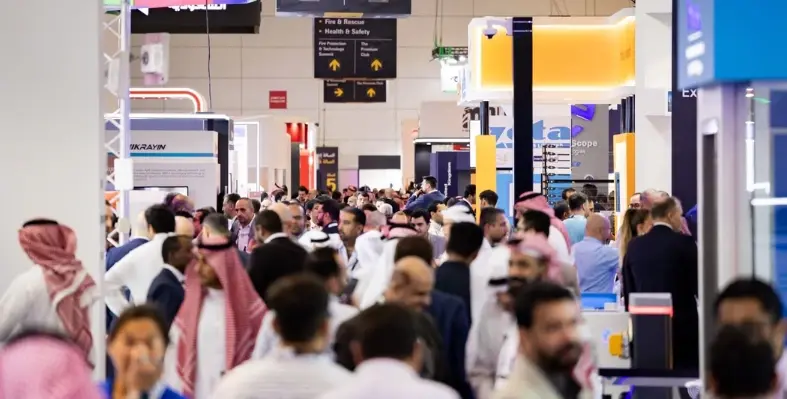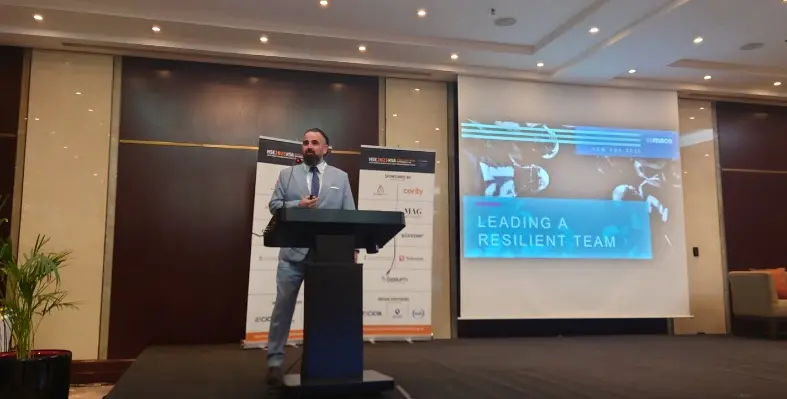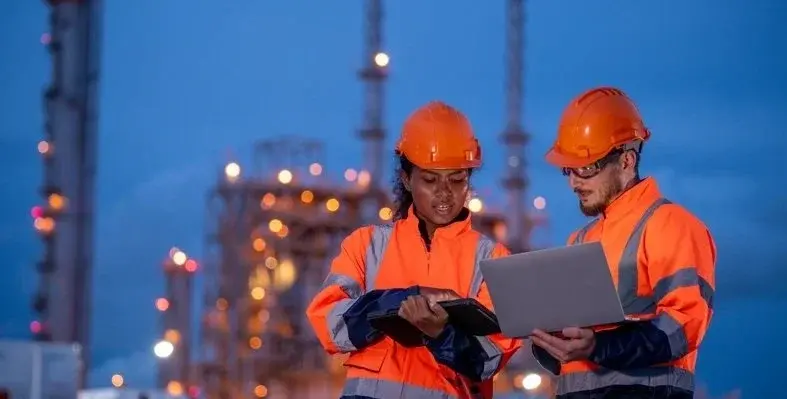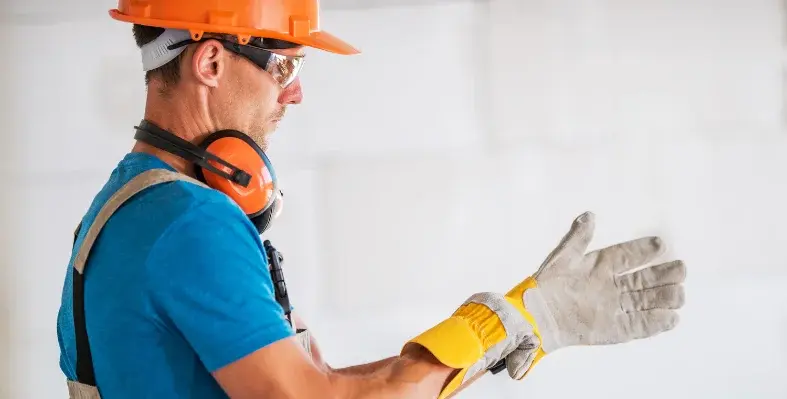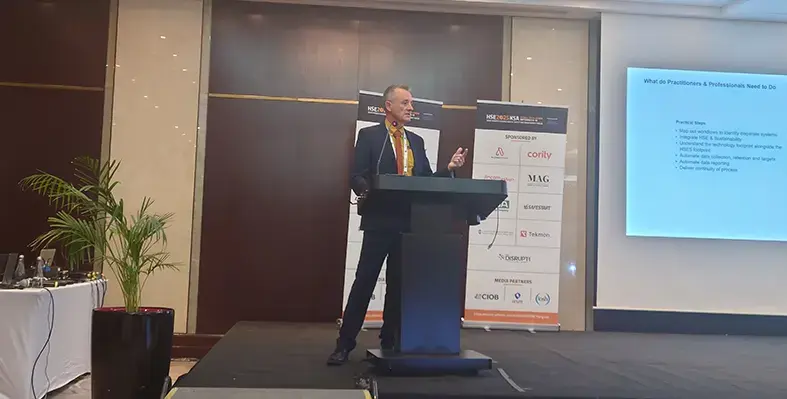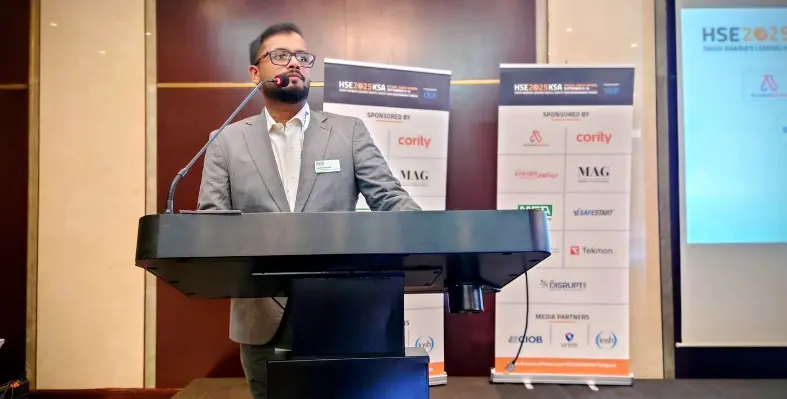Regional Coverage
Regional Coverage
- Details
- Sania Aziz
- Europe
- Date: 26 September, 2025
- Year: 2025
This year’s Fall Prevention Awareness Week demonstrated how far the UK has come in tackling deaths and severe injuries caused by falls.
Most hearteningly, it showed that organisations and the wider public are beginning to change from the belief that falls are just an inevitable part of ageing, but rather a serious – and often deadly – health risk.
However, as the Falls Prevention Awareness Week theme ‘From Awareness To Action’ illustrates, it is practical evidence-based interventions that are most needed to tackle the rising crisis in deaths from falls, which have increased by 90 per cent over 10 years. Accidental falls also account for over 400,000 A&E admissions, putting immense pressure on the NHS and costing over £4 billion every year.
Practical evidence-based interventions are exactly what RoSPA provides through our Fall Fighter campaign and online Falls Prevention hub. Designed in collaboration with housing providers and healthcare experts, these free resources enable individuals at particular risk, and the professionals or family and friends who may be caring for them, to reduce the likelihood of a serious fall at home.
Crucially, while the resources contain plenty of advice on eliminating trip hazards in the home, Fall Fighter focuses on the person themselves, as opposed to just the environment around them. For example, physical deconditioning caused by a sedentary lifestyle – exacerbated by periods of inactivity as seen during the COVID lockdown – is a major risk factor for falls. The Falls Management Exercise (FaME) 24-week programme showed 20-30 per cent of older adult falls could be prevented by improving strength and balance, and our resources contain advice for simple exercises to improve strength and balance.
Workplace falls
However, while falls account for four out of five hospital admissions for people over 65, and over 50 per cent of falls happen at home, there are valuable lessons for other groups in other places too. Falls from height are the biggest single cause of deaths in the workplace, so the concept of putting people at the centre of falls prevention has particular importance for occupational safety and health (OSH) strategies, especially as an ageing workforce brings increased levels of risk. Nor are those risks just to do with physical strength or frailty – mental health issues caused by workplace stress or the side-effects of prescription medication can also make a severe fall more likely.
This means that preventing falls in the workplace must move beyond simply asking ‘What shoes are people wearing?’ to asking ‘What are all the different risks for each individual worker?’. This necessary holistic perspective on risk must come from good staff engagement to understand all the many issues – personal, social and clinical as well as environmental – at play. In other words, managing fall risks effectively in the workplace means listening to what staff say as well as what can be seen or what data shows. Just as no good safety manager would ignore the risk of falls posed by a cluttered floor, they cannot afford to ignore equally dangerous issues that cannot always be seen.
This article was written by RoSPA OSH & Falls Manager Jules Robinson
- Details
- Louise Waters
- Middle East
- Topic: HSE
- Region: Middle East
- Date: 26 September 2025
- Year: 2025
At HSE KSA, taking place from 9-10 September in Riyadh, a panel discussion took place on safety leadership and high reliability organisations, emphasising the importance of leadership accountability in HSE.
Introducing the session and the main themes, moderator Muhammad Jawad Ali, director and board member of The Disrupt Labs commented, “Real leadership means real outcomes in HSE. So today, we'll go beyond the compliance checklists and talk about how leadership accountability can transform safety from a policy to live cultures from the board room to the site."
Accountability in practice
Simon Watson, chief HSSE officer, ACWA Power addressed the question of what accountability in HSE leadership means in practice, embedding accountability from the boardroom to the work site. He highlighted the importance of clarity in roles and responsibilities, from the board and CEO all the way through to the front line workforce, describing how ACWA Power had focused on the 10 most important safety tasks for each role, with KPIs created to measure performance. This approach is also adopted with its contractors and EPCs, with health and safety milestones and deliverables tied back to monthly milestone payments. These focus on the 10 most critical factors that are causing the most issues reputationally and from a safety outcome standpoint, including critical risk management performance and welfare and accommodation standards, with payments withheld for non-compliance.
Watson also suggested measures to ensure fairness and consistency in accountability conversations throughout the organisation.
Through its ‘Year of Accountability’, starting in 2025, the company had reset the bar, clarifying the company’s priorities and how they should be cascaded throughout its supply chain, he added.
Top-down versus bottom-up
Larry Wilson, CEO SafeStart highlighted the challenges of focusing solely on a top-down approach and relying on first-line supervisors to communicate safety messages effectively.
“If you’re going to have a positive and proactive safety culture it has to have some support from the bottom up,” he said, noting that first line supervisors may be stressed, overworked and may not necessarily have the right skill sets or communication skills.
Cultural differences in the Middle East were addressed, when it was pointed out that leadership tours can influence safety culture positively, and can become learning opportunities. Robert Munn, senior VP HSE, Sports Boulevard Foundation shared examples of leadership tours being reframed as engagement opportunities to build trust and accountability, for example when a leader follows up on a problem reported to them.
Discussing the blame culture and culture of fear still prevalent in the Middle East, he said, “Yes, we need to hold people accountable, but we don’t need to blame people. There’s a difference.” Building trust and creating a no-blame environment where people feel free to discuss issues openly takes time and does not happen overnight, he added.
Prioritising safety risks
Elaborating further on the question of which safety risks to prioritise and how leaders can ensure systematic issues don’t get overlooked, Watson highlighted ACWA Power’s focus on critical risk management and measuring the presence of its critical controls.
“Risk assessment doesn’t stop a fatality, it’s the process, the things you check that do. We’re crystal clear on what’s important to us – preservation of life and assets.”
This focus is embedded throughout the organisation and its contractors in terms of accountability and performance measurement, he said.
Discussing the role leadership plays in proactively identifying and mitigating risks before they escalate into serious incidents, Munn said this starts from the top and cascades all the way down. Echoing Watson’s message on priorities, he said, “The message is very clear, critical risk management and high potential events is our main focus area.”
This message is driven down through contractor training at all levels to educate them on managing critical risks, which is linked to their monthly payments and tied into the KPIs of the Sports Boulevard leadership itself.
“It’s not about compliance from day one,” he went on. “This is a journey we’re all on together, whether we’re the client, whether it’s our PMC, whether it’s our contractors, their subcontractors and delivery partners. If one bit fails, then we all fail. So from our side, it’s around educating and coaching so it’s the contractor making those conscious decisions, and not just being driven by me and my team.”
Discussing the visibility of leadership and impact of strong health and safety leadership on the overall safety culture on construction sites and on incident rates, Munn emphasised the onus on the leadership to drive through the culture of safety, with commitment required from all CEOs working with Sports Boulevard to meet its standards and requirements.
He discussed the challenges of changing the culture of compliance and reiterated the need for leadership to be visible and felt, breaking down barriers to create a culture where conversations around health, safety and welfare can take place, thus transforming the worksite.
Safety reporting
Addressing the question of safety reporting, Watson highlighted ACWA Power’s newly-introduced Reporting Integrity Index, which measures the quality and accuracy of safety reporting, explaining how it gives a truthful picture and changes the narrative around safety performance in senior leadership meetings. There followed some discussion about the importance of focusing on adding value, holding people accountable for proactive activities and continuous improvement, as opposed to checking boxes. As Larry Wilson put it, “Our job is to make sure that those activities we’re holding people accountable for will produce a dividend.”
Watson added that the integration of AI into reporting systems which can, for example, query corrective actions and recommend better ones, giving a quality score for inputs, has resulted in a demonstrable difference in the quality of work. “It’s educating you about what good practice is every time you go into the system. It’s the biggest change in reporting I’ve seen in a decade,” he said.
Summing up, Muhammad Jawad Ali said, “Accountability in HSE is not about adding more compliance layers. It’s about embedding ownership at every level of the organisation, prioritising the risk that really matters, using structures and systems to measure and incentivise accountability, leading visibly and consistently and last, but not least, leveraging innovation and technology to stay proactive, not reactive.
“Accountability is not a report, not a KPI or a compliance audit, it’s a leadership value that must translate into daily actions. If every leader owns safety, measurable outcomes will definitely follow.”
- Details
- Matthew Hayhoe
- Middle East
- Topic: HSE
- Region: Middle East
- Date: September 25, 2025
- Year: 2025
A 30-year agreement sees Saudi Aramco, Marafiq, Veolia and Lamar collaborate on an industrial wastewater treatment and recycling initiative
Set to launch in Q3 2028, the partnership will jointly develop a US$500 million water recycling plant, able to process up to 8.76 million cubic metres of water annually, in the Middle East's largest petrochem hub, Jubail Industrial City.
Saudi Aramco Total Refining and Petrochemical Company (SATORP/Saudi Aramco) president Mohammad A. Al Hatlani announced the partnership. "This project is perfectly in line with the Kingdom's strategy to reduce the environmental impact of industrial activities and promote a circular economy approach.
"Veolia and Marafiq, the pioneers and leading providers of complex industrial wastewater management solutions in the Middle East, will operate the wastewater treatment plant in Jubail, leveraging their comprehensive expertise covering the entire industrial wastewater treatment chain."
Veolia CEO Estelle Brachlianoff added, "We are extremely proud to continue supporting the Kingdom of Saudi Arabia in its journey towards sustainable growth by leveraging our expertise and cutting-edge technologies in industrial wastewater treatment."
- Details
- Matthew Hayhoe
- Middle East
- Topic: HSE
- Region: Middle East
- Date: 23 September, 2025
- Year: 2025
The chairman of the Dubai Supreme Council of Energy (DSCE) chaired the 90th council meeting, which discussed current net zero and emissions strategies
During the meeting, the DSCE approved the Greenhouse Gas Emissions Inventory 2024, and signed off on the winners of the upcoming 2025 Emirates Energy Award, which will be announced at a ceremony next month.
Saeed Mohammed Al Tayer, DSCE vice chairman, said, "In line with the vision and directives of His Highness Sheikh Mohammed bin Rashid Al Maktoum, Vice President and Prime Minister of the UAE and Ruler of Dubai, to consolidate Dubai's global leadership in clean energy, sustainability and energy efficiency, we continue to implement pioneering projects that enhance Dubai's position as a global hub for innovation and investment in the energy sector.
"Our goal is to support the sustainability road map and achieve the Dubai Clean Energy Strategy 2050 and the Dubai Net Zero Carbon Emissions Strategy 2050 to provide 100% of the emirate’s energy production capacity from clean sources by 2050. We attach great importance to adopting best practices and advanced technologies that increase the efficiency of resource use and support Dubai’s sustainable development in line with the UAE’s national initiatives and federal strategies."
As well as HH Sheikh Ahmed bin Saeed Al Maktoum, DSCE chairman, and Al Tayer, vice chairman, the meeting welcomed the attendance of HE Ahmed Buti Al Muhairbi, secretary general of the council, and board members HE Marwan bin Ghalita, acting director general of Dubai Municipality; HE Abdulla bin Kalban, managing director of Emirates Global Aluminium (EGA); HE Hussain Sultan Lootah, acting CEO of Emirates National Oil Company (ENOC); Juan-Pablo Freile, general manager of Dubai Petroleum and Dubai Supply Authority (DUSUP); and Muna Alosaimi, chief executive officer of the Strategy and Corporate Governance Sector at the Dubai Roads and Transport Authority (RTA).
Secretary general Al Muhairbi added, "The council has approved two important regulatory frameworks for trading petroleum products in Dubai: the Safety Policy in Petroleum Products Trade Policy, which aims to ensure the highest standards of health, safety and environmental protection, and the Regulatory Framework for Petroleum Products Trade, which provides comprehensive governance mechanisms to enhance transparency, efficiency and compliance in the sector."
- Details
- madhurima sengupta
- Middle East
- Topic: Events
- Region: Middle East
- Date: 23 September 2025
- Year: 2025
As Saudi Arabia’s leading health, safety and environment (HSE) forum unfurled in Riyadh from 9-10 September, insightful panels and presentations gave an idea of the region’s evolving industry
One such session titled ‘From Human Error to Enhanced Performance: The Future of High Reliability Organisations’ spearheaded by Larry Wilson, the Chief Executive Officer of safety solutions provider, Safestart, delved into how the definition of safety has seen a marked shift in recent times.
While safety in workplaces is largely understood as ‘loss control’, with a director or vice president manning the post, focusing solely on prevention, this can pose certain limitations. Employees in a company often find themselves in a fix when trying to get the senior management engaged during loss situations.
But if safety can be taken as a means to attain enhanced performance, it unlocks a fresh perspective beyond just the prevention of injuries or loss to include reduction of human errors, allowing improved production efficiency and quality while reducing scraps and customer complaints.
Wilson spoke on how Safestart is shaping the future of safety by pushing the boundaries of loss prevention. According to him, even the hierarchy of controls in safety can’t always avoid critical errors. The firm addresses these challenges with tools that help get the mind and eyes back on the task, and get into the zone, establishing focus before delivering reliable performance. This spins the concept of loss and safety to generate production. The session also served as a glimpse into Safestart’s upcoming workshop on critical error reduction techniques that will be held in Riyadh from 21-22 October, in association with Offshore Network.
According to Wilson, in the past 25 years, over 5 million people across 75 countries are benefitting from following the critical error reduction technique, which is framed on the basis of state error pattern identification. This pattern, driven by the concept that the states come before the errors, can eliminate 95% of the injuries if identified promptly. While errors are unpredictable, ironically, the states that cause them are actually very predictable, and can be controlled by controlling the mind, moment and performance.
It is possible to anticipate errors by self-triggering on the active states – rushing, frustration, fatigue – the actual feeling in the moment. Self-triggering is the first step to following the critical error reduction approach. One has to promptly think in the lines of ‘eyes, mind, line of fire, balance, traction, grip’. Identifying state error risk patterns makes one think about the risk. In other words, keeping the worst possibilities in mind can help create a quick reflex response. However, self-triggering cannot be achieved if complacent and in a passive state, as it causes the mind to be not on task.
Wilson laid out the primary safety-related habits, based on one’s profession and lifestyle. Snowboarders/ skiers or those who work at height must test their footing and grip before committing to weight.
When driving, it is important to move the eyes first, before moving the hands, feet or body.
Spokespersons from companies which have benefitted from Safestart resources were also present during the session. American multinational corporation, Kimberly Clark, has seen a 74% decrease in recordable injuries and 20% improvement in asset conversion with Safestart’s support.
While Nucor Steel recorded a 53.5% decrease in cost per ton, Scott Forge saw a 40% decrease in customer complaints since the last two years.
Heineken in Brazil recorded an 85% decrease in lost time and recordable injuries, as well as a 50% decrease in traffic fines for their sales people.
Four out of seven plants of Quadrant Plastics saw zero recordable injuries for three years.
Speaking of Safestart’s efficiency in providing region-specific solutions, Wilson said that it is based on neuroscience and works on a train-the-trainer model. The company thus works in collaboration with local trainers to make the experience more tangible and well suited to the respective region’s workplace and culture.
- Details
- Sania Aziz
- Middle East
- Date: 24 September, 2025
- Year: 2025
Intersec Saudi Arabia, the Kingdom’s leading platform for security, safety, and fire protection, will open its 7th edition on 29 September at the Riyadh International Convention and Exhibition Center (RICEC), running until 1 October.
Following a record-breaking 2024 edition, the event has grown further, hosting over 380 exhibitors from more than 36 countries and expecting upwards of 27,000 attendees.
Held under the patronage of His Royal Highness Prince Abdulaziz bin Saud bin Naif bin Abdulaziz Al Saud, Minister of Interior, and in association with the General Directorate of Civil Defense, Intersec Saudi Arabia serves as a key meeting point for global and regional experts.
The conference programme features two flagship summits: the Future Security Summit, powered by ASIS International - Dahran Chapter, and the Fire Protection & Technology Summit. These sessions will spotlight innovative strategies supporting Saudi Arabia’s giga-projects, smart city developments, and national security initiatives. For the first time, all conference sessions are CPD-certified, allowing delegates to earn recognised professional credits while engaging with industry insights.
The Future Security Summit spans two days of sessions delivered by regional experts, global thought leaders, and industry professionals, covering topics such as mega-event security, cybersecurity, homeland security, and aviation security. On the opening day, a panel will explore the security of giga-projects, featuring representatives from King Salman Park Foundation and Red Sea Global, alongside regional security specialists, discussing how protection strategies integrate with environmentally conscious urban planning.
Other sessions include “Beyond Borders: Regional and Global Security Cooperation in a Shifting Geopolitical Climate,” with contributions from the United Nations Office on Drugs and Crime (UNODC), Aramco, Naif Arab University for Security Sciences, and the National Security Services Company (SAFE).
The Fire Protection and Technology Summit will highlight the future of fire and emergency response, featuring international leaders at the forefront of innovation. This year introduces a collaboration with the National Fire Protection Association (NFPA), which will host a dedicated programme on the second day, bringing world-class fire protection expertise to the Saudi market. Highlights on the first day include a keynote from Saudi Civil Defense, followed by a session with the International Code Council on updates to the Saudi Building Code (SBC).
Terrance Tsang, Chief Fire Officer, Hong Kong Fire Services Department, will present on “Enhancing the Safety Standard of Super High-rise Buildings,” while representatives from King Fahad International Airport will discuss “Fire Prevention Management for Airport Facilities.”
- Details
- Leah Kelly
- Middle East
- Topic: HSE
- Region: Middle East
- Date: 19 September, 2025
- Year: 2025
Head of HSW for Mace at Qiddiya, Blair Boyd, took to the stage at HSE KSA 2025 to shine the spotlight on the importance of understanding mental illness within the workplace, and discussed how the company is integrating the power of psychological safety into its core values to best support workers
“Unfortunately discussions on mental health is quite a difficult subject for people to talk about, and there's a few reasons why people feel that there's social or professional repercussions from discussing mental health,” Boyd said in his opening remarks for a session dedicated to removing the stigma of workplace mental health.
In his presentation, Boyd touched on the UK statistic stating that over the last decade, 7,000 tradespeople have died from suicide relating to their mental health.
“People fear that they may be disregarded as a professional for having that discussion. Some people internalise shame and self-stigma. And stigma is a big barrier to mental health discussions,” he stated.
Boyd turned the spotlight towards the leaders across the industry, asking who looks after the managers and team leaders if they are the ones suffering from stress and added pressure.
“One of the things we recognise at Mace is who do our leaders talk to if they need help? The leader has to be the strongest person in the room, the person that’s leading the organisation or leading the project […] so we implemented a programme to give them a support function, a safe space to offload any problems that they are having.”
Workplace worries
Statistics state that from 2023/2024, there were 776,000 cases of work-related stress, depression or anxiety recorded within the UK, causing 46% of all work-related ill-health cases and 55% of all working days lost due to ill-health.
Boyd stressed how integral it is to control exposure to stress within the workplace as outside factors may continue to effect employees but a safe space within a working environment can help mitigate against performance deterioration.
“Which ones [indicators for stress] can we control in the workplace? We can control workload. Don't overload our people. We can control relationship issues, if it's interpersonal issues between people and the workplace, we can be open and honest and transparent with the news that we have, and not hold things close to their chest. Tell people about what's happening on the project, and we can reassure our teams that have future uncertainty.”
Power of psychological safety
Boyd began to analyse Mace’s own behaviour culture and the treatment of employees’ mental health. The company has integrated psychological safety into its core values in a bid to create a thriving workplace that prioritises health, safety and wellbeing while fostering trust and collaboration.
“The workplace is the modern day hunting ground. Our colleagues are a tribe, and they want to feel a sense of belonging. How do we empower them to positively influence a sense of belonging within the workplace? Well, it's about culture,” Boyd said.
“I like the quote ‘the culture of an organisation is shaped by the worst behaviour the leader is willing to tolerate’ […] As a leader, it is our duty to ensure that we don’t let those personal biases creep into the workplace and treat everyone equally.”
Some of the leadership practices Mace has introduced include:
- Lead by example
- Communicate and share vision
- Develop competence to enable others to act
- Engage your team in the Mace behaviours
- Reward and recognise
- Look for ways to continually improve
“We [at Mace] seek to identify and observe the surroundings, engage with our colleagues and seek ways to improve our processes. Health and safety is fundamental to everything that we do at Mace, and our CEO will tell you the most important thing, and the thing that keeps them awake at night is making sure that the sites are safe and healthy environments to be in, and that people's well-being is respected,” Boyd concluded.
- Details
- Louise Waters
- Middle East
- Topic: HSE
- Region: Middle East
- Date: 22 September 2025
- Year: 2025
A new Human Energy Health and Wellbeing Award has been launched, which will recognise and reward excellence in physical and mental well-being across the global energy sector
Presented by Response Plus Holding PJSC (ADX: RPM), the leading pre-hospital care and emergency medical services provider in the Middle East, and Burjeel Holdings (ADX: Burjeel), a leading super-specialty healthcare provider in MENA, and supported by the leading UK-based defence medicine training company, Prometheus Medical International, the US$1million Human Energy Award is currently open for submissions.
The Human Energy Awards initiative is closely aligned with the UAE’s National Strategy for Wellbeing 2031 and the ‘We the UAE 2031’ Vision, which positions the UAE as a global leader in quality of life by fostering healthy lifestyles, promoting mental wellness, and encouraging a culture of positive thinking. The initiative addresses a growing awareness of the need to prioritise mental health, resilience, and holistic wellness as integral components of operational performance and employee engagement.
The award will honour one organisation in the energy sector that demonstrates the most innovative and measurable impact on workforce wellbeing. With a focus on scalable solutions and inclusive participation, particularly from SMEs, the initiative reflects the UAE’s commitment to empowering all segments of society through strategic ESG investments.
Dr Rohil Raghavan, CEO of Response Plus Holding PJSC, said, “The Human Energy Awards are more than a recognition platform. They are a catalyst for change. By aligning with the UAE’s national agenda, we are reinforcing the international importance of health and wellbeing as strategic imperatives for economic resilience and global competitiveness.”
Steven Wines, CEO of Prometheus Medical International and Head of the Award Steering Committee, added, “The US$1 million Human Energy Award is designed to recognise and inspire organisations who think differently about health and wellbeing. We want to encourage innovative solutions that make a tangible difference to people across the Energy sector.”
The inaugural winner will be announced in November during ADIPEC 2025, Organizations interested in applying can submit their entries by September 30, 2025.
For more information on participation and submission guidelines, visit https://humanenergyawards.com/
- Details
- Matthew Hayhoe
- Europe
- Topic: PPE
- Region: Europe
- Date: 19 September 2025
- Year: 2025
Europe is expected to contribute significantly to what Credence Research estimates to be a US$30 billion gloves market in the next seven years
The Global Safety Gloves Market report anticipates a market CAGR of 7.2%, reaching US$30.36 billion by 2032.
Construction, healthcare, oil and gas, and manufacturing were listed as the sectors most likely to fuel demand for safety gloves, especially in emerging economies undergoing rapid industrialisation.
Whilst North America is expected to hold the demand share of market demand, growing standards and an emphasis on sustainable products make Europe a fierce competitor over the next seven years.
Credence Research highlighted the UK, Germany and France specifically as three key nations where stricter regulation is anticipated to bolster demand.
- Details
- Louise Waters
- Middle East
- Topic: HSE
- Region: Middle East
- Date: 19 September 2025
- Year: 2025
At HSE KSA, held in Riyadh from 9-10 September, Dr. Paul Robinson, managing director of Acumen, gave a keynote presentation underlining the importance of building a proactive and connected digital footprint to support HSE and sustainability practices, and providing valuable advice to help organisations more effectively manage their digital footprint
Robinson began by stressing how important it is to understand the digital footprint, and its impact from an HSE and sustainability perspective.
“We’re all consumers of technology at the workplace, and every time we use a technology platform we are creating a digital footprint,” he said, explaining that while HSE professionals now have access to a huge range of software solutions and easily-implemented cloud-based solutions, this proliferation has also increased the complexity and messiness of the digital footprint. As a result, IT departments can become reactive rather than proactive.
Understanding the digital footprint
Defining the digital footprint, Robinson said, “In a nutshell it is those tools, technologies and solutions that help collect analyse, process and report on data. Put simply, it is those technologies you use every day, it is that digital capability for collecting and processing data.”
The HSES digital footprint can take many forms, from the everyday office tools used to collect HSES data, everyday mobile applications and in-field data collection, to ERP systems and integrated HSES systems.
“It’s all those elements put together.”
He emphasised that not all digital footprints are the same, and that some work better than others.
Discussing the challenges of managing the digital footprint, he explained that in many organisations, HSE and sustainability are often an afterthought, leading to a messy digital footprint with data in silos. With AI, the annual cycle of data collection, analysis and reporting becomes more complex.
“AI is not just collecting data, it isn’t just processing data, It’s becoming your 24/7 eyes on your data and your environment. So importantly, your technology platform has to allow you to collect data, analyse data, allow reporting both internal and external, allow you to baseline and allow you to have access to historical data.”
Robson introduced the ‘reach and range’ concept from Howard Business School, which helps conceptualise an organisation’s digital footprint in terms of how richly it can collect data.
“Reach is how far your HSE systems can reach into your organisation, and range is how rich those systems can allow you to collect data. The better the reach and better the range you have, the better systems and technologies you will have.”
Integrated vs disparate systems
Robinson discussed the importance of integrating safety and sustainability practices into daily work activities to reduce the annual effort required for data management, explaining that most organisations have a mix of integrated and disparate systems, which complicates management and increases the risk of losing critical data.
He shared case studies comparing an organisation with disparate systems looking to manage safety and sustainability in silos, with one operating a fully integrated system and managing safety and sustainability with a connected strategy. He highlighted the resource-intensive nature of managing disparate systems, explaining that a connected digital footprint reduces effort, enables continuity, automates processes and facilitates smoother workflows.
Introduction of new tools
Robinson underlined the need for a connected digital footprint to support the implementation of new tools and technologies efficiently. He explained that the introduction of new technologies, such as behavioural-based safety and AI, further complicates the digital footprint if not properly integrated, creating more data and more complexity along with the potential for errors and loss of data.
“AI is all-engulfing, and your digital footprint and technology stack have to support that. As HSE and sustainability practitioners, you need to be aware of the impact this could have on your organisation and how to manage it,” he said.
Avoiding disparate and closed systems and those that will not allow change and evolution is critical.
“A connected approach will allow you to implement newer technologies, newer tools, newer techniques, and AI more easily. Importantly, they are embedded into your workflows, becoming part and parcel of your daily activities.
“Fully integrated systems need to be in place, where you can access data across safety, across sustainability, across health, across training, across jobs. That’s really, really important.”
Practical steps
Offering some practical steps for a better HSES footprint, Robinson suggested,
• Map out workflows to identify disparate systems
• Integrate HSE and sustainability
• Understand the technology footprint alongside the HSES footprint
• Automate data collection, retention and targets
• Automate data reporting
• Deliver continuity of process
Concluding, Robinson advised, “Think about your digital footprint, the clear continuity of your digital footprint, your reach and range, and be integrated and connected. It will make a huge difference if you can start to bring your systems together and make your HSE and sustainability systems part of your everyday systems, rather than disparate reporting systems.”
- Details
- Sania Aziz
- Middle East
- Topic: HSE
- Date: 17 September
- Year: 2025
At the HSE KSA event held in Riyadh from September 9–10, Suphil Thomas, country sales manager for MSA Safety, delivered a compelling keynote on fall protection, championing a holistic, site-specific approach to workplace safety that reflects MSA’s global leadership in the field.
“At MSA, our mission is clear: to ensure that men and women return home safely from work, and that their families and communities flourish in health and well-being,” Thomas declared, setting the tone for a transformative dialogue on safety culture.
With over 15 years of hands-on experience in Saudi Arabia, Thomas emphasised the critical need for customised safety strategies. “No two sites are the same,” he noted, challenging the widespread reliance on generic risk assessments. “Too often, contractors use pre-filled templates—they simply copy and paste.”
Representing MSA Safety, a century-strong global pioneer in safety innovation, Thomas spotlighted the company’s unwavering commitment to excellence. “We’re not just a manufacturer—we’re a safety partner. Our focus is on developing cutting-edge technologies and delivering tailored solutions that meet the unique needs of every customer,” he said.
Today, MSA protects over 40 million workers worldwide, and continues to raise the bar for safety standards across industries.
Thomas introduced MSA’s 360-degree fall protection strategy, built on five foundational principles. The first and most important: eliminate the need to work at height whenever possible. “If you can keep someone off the roof, do it. Risk avoidance is the smartest protection,” he advised.
He detailed high-risk environments—from rooftops and cranes to aviation and telecom towers—where fall protection is non-negotiable. “MSA is proud to be a trusted supplier of aviation maintenance kits. We’re listed in the spare parts catalogues of Boeing and Airbus,” he added, underscoring the brand’s global credibility.
A key insight from the presentation was the distinction between basic compliance and true safety. “Compliance sets the minimum. As HSE professionals, we must go beyond that—to protect lives and uplift communities,” Thomas urged, advocating for rigorous training and proactive site management.
He outlined the hierarchy of fall protection:
• Eliminate the hazard
• Guard the hazard (e.g., guardrails, handrails)
• Equip individuals with personal protective equipment
• Enable rescue systems
To illustrate, Thomas shared a practical innovation: “Instead of climbing a ladder with a sponge, workers now use extendable poles to clean windows from the ground. That’s how smart design reduces risk.”
Clarifying accountability
Thomas addressed a critical question: who bears responsibility for fall protection? “Ultimately, it’s the facility owner who must ensure a safe working environment. Contractors bring their PPE, yes—but anchorage points and safe access systems must be provided by the end user.”
He stressed that fall protection systems must be custom-engineered for each site. “Design matters. A system built for two users may be cost-effective, but if you’re sending six people to the roof, that’s a design flaw.”
Installation and inspection are equally vital. Systems must be installed by certified professionals and inspected by authorised experts. “Skipping steps—like applying water sealant on membrane roofs—can lead to leaks. That’s an installation error, not a product defect,” he warned. Unauthorised third-party inspections are unacceptable and compromise safety.
Thomas likened fall protection systems to fire extinguishers: “They require annual inspections—just like any other critical safety equipment.”
Training: the final link
Thomas closed with a powerful reminder: “What’s the point of having a system if your team doesn’t know how to use it?” He cited a common misuse: “I’ve seen people fully retract a self-retracting lifeline (SRL) and attach it to a lower rung of a ladder—that’s incorrect.”
For industries across Saudi Arabia, Thomas offered a clear and actionable blueprint for elevating fall protection standards. “Fall protection is like a chain,” he concluded. “If one link is weak, the entire system fails.”
- Details
- Sania Aziz
- Europe
- Date: 18 September, 2025
- Year: 2025
The UK’s Health and Safety Executive (HSE) has warned that poor management of personal hearing protection is leaving workers at risk of permanent damage, regardless of investment in earplugs or earmuffs.
Personal protective equipment sits at the bottom of the hierarchy of control because it requires constant attention and correct use.
Unlike engineering solutions that operate automatically, hearing protection depends on training, supervision and individual behaviour.
“This isn’t about blame – it’s about recognising a key challenge,” said Chris Steel, HSE’s principal specialist inspector.
From inspections across workplaces, HSE has found recurring weaknesses in how companies provide, maintain and monitor hearing protection.
Equipment in poor condition is a common problem: earmuffs with cracked seals or stretched headbands provide little protection, while single-use earplugs lose their effectiveness once removed and should not be reused. Inspectors also reported cases where moulded plugs had been worn for decades, despite changes in ear canal shape and material degradation.
Accessibility is another issue. Protection must be available where and when workers need it, not stored away. HSE highlighted examples where employees had to walk long distances to fetch their plugs after already entering noisy environments. Incorrect fitting is also widespread.
The CUFF approach
Earplugs require proper insertion technique, while earmuffs can fail if worn over hats, hoods or hair accessories. In addition, not all workers can use the same protection, so employers are required to offer suitable alternatives.
Technical suitability is equally important. Each product carries a Single Number Rating (SNR) that should match actual workplace noise levels. Over-protection brings its own risks by preventing workers from hearing alarms and safety signals.
To help employers manage these challenges, HSE promotes the CUFF approach: condition, use, fit and fit for purpose.
This framework ensures that hearing protection is effective, appropriate and compliant.
Personal hearing protection demands active management rather than passive provision, according to Steel. Once hearing damage occurs, it cannot be reversed.
“Hearing protection is useless sitting in storage whilst workers operate noisy equipment,” Steel added. HSE emphasises that companies who properly manage their programmes not only reduce injury rates and strengthen compliance, but also protect something irreplaceable: the long-term hearing of their workforce.
